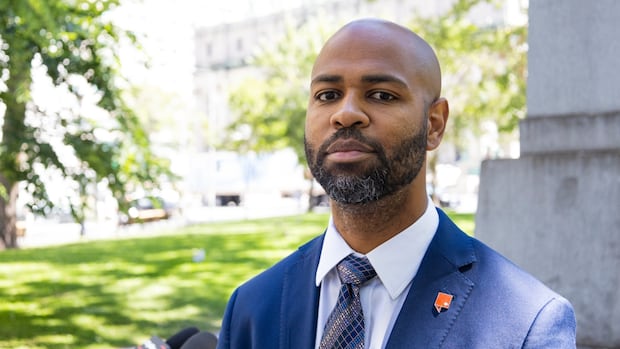An independent committee’s 50 recommendations to Quebec, including extending the province’s religious symbols ban to subsidized daycares and requiring people to uncover their faces when receiving public services, are drawing criticism from some community leaders.
“We really have to ask some serious questions about the legitimacy of this report,” said Stephen Brown, president of the National Council of Canadian Muslims.
He said the nearly 300-page report released on Tuesday offering recommendations to strengthen secularism in Quebec is not suggesting that the government “proceed in the spectrum of neutrality.”
“Neutrality is the absence of an opinion. In this case, what we’re really looking at is recommendations for the government to take away the rights of religious people and to impose uniformity on them,” he said.
The committee is co-chaired by lawyers Guillaume Rousseau and Christiane Pelchat. They have each defended Quebec’s secularism law, Bill 21, in court while representing groups who promote secularism in Quebec.
The report followed a five-month review announced in March by Secularism Minister Jean-François Roberge and responds to concerns, including a previous government report highlighting alleged toxic behaviour and religious favouritism in a Montreal elementary school.
It is unclear how the Legault government plans to implement the recommendations, but one proposal is attracting particular attention: banning the wearing of religious symbols in subsidized daycare centres.
‘We feel that our rights are violated’
The committee said employees have a right to work in secular institutions and children need to be protected from religious pressures.
But the Montreal chapter of the Canadian Council of Muslim Women is strongly criticizing the report. Its president, Farida Mohamed, said it feels like a direct attack on Muslim women “because a lot of the care workers are actually Muslim women who are veiled.”
She said the Muslim community is being targeted and discriminated against, especially women.
“We feel that our rights are violated. The economic freedom of Muslim women is being violated,” she said.
Anne Dionne is second vice-president of the Centrale des syndicats du Québec (CSQ), which represents daycare, education and health-care union federations.
She said it remains to be seen if any of these recommendations will be proposed as legislation, but already there are concerns about the impact on the daycare system when there is already a staff shortage.
She said the first priority in daycares is primary learning and the well-being of the children, zero to five years old. There is already a secular education program in place, and educators must follow those parameters.
“And that’s where we want to put our energy,” said Dionne. “And that’s why we keep saying, and keep bringing back, what will the impact be on staff? Because we need staff. We need qualified staff.”
She said the kids’ needs should come first.
Constitutional challenges expected
Pearl Eliadis, a human rights lawyer and associate professor at McGill University, said the recommendations represent a proposed fundamental change to Quebec’s legal and constitutional framework.
“And that includes something that has not been in the media very much, but the government is actually proposing a unilateral modification of the Canadian constitution — the 1867 constitution — as creating the groundwork for building a structure that really ousts all religion from the public and quasi-public spaces in Quebec,” she said on CBC Montreal’s Daybreak Wednesday.
Expanding the religious symbol ban to subsidized daycares is a logical progression, Eliadis said, but case law suggests these legislative prohibitions would not survive without the notwithstanding clause.
She described such legislation as “clear violations” of the Canadian constitution and the Quebec Charter.
The committee also recommends phasing out public funding of religious private schools and says universities should be able to refuse requests for prayer rooms for students.
Eliadis said there is an incoherence in funding minority religious schools while maintaining a provincewide non-religious school system, but funding allows Quebec some control over curriculum.
She warned that pulling funding could raise concerns about isolating these schools and potentially “more radicalization, which this very proposal is seeking to end.”
Eliadis said some of the committee’s recommendations make sense to her, such as those on ensuring medical services like abortion are protected regardless of some groups’ objection.
“I think the report is right to raise concerns about religious extremism in the United States,” she said, but, she added, the overarching framework is “so extreme” that it could be used to oppress religious minorities.
She said roughly 75 per cent of the recommendations could be subject to immediate constitutional challenges, but given the past, it’s very likely the government would lean on the notwithstanding clause.







